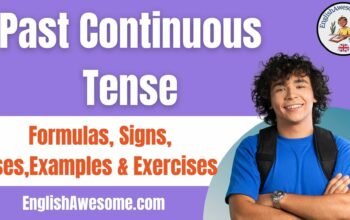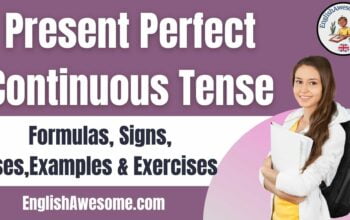How many parts of speech are there in English? There are eight parts of speech in English: noun, adjective, adverb, pronoun, verb, preposition, conjunction, and interjection.
Here in this lesson, we will cover the Noun and then we will move ahead with others. Now learn What is a noun? What is its definition? What is its use of it? and what are its kinds or types etc?
Let’s learn with English tivi on the topic: Parts of Speech Noun Examples right now!
⏩ Sign Up to Get Bonus

1. Definition
A noun is a person, an animal, a thing, a place, an action, an idea, feeling, a quality, or a state of being.
2. Kinds of Nouns
2.1 Common noun
It names a class or a group of ground of a person, places, things, ideas, or feelings. Usually, it would help if you wrote it with a capital letter only it begins a sentence. It is the opposite of a proper noun.
Examples:
- She will be my fiancee next year.
- Are you a man or a mouse?
- We can forget to develop our motherland.
2.2 Proper noun
It names a particular person, place, or thing. It is always capitalized. You always write it with a capital letter since the noun presents a specific person, place, or something. For example, the names of days of the week, months, historical documents, institutions, organizations, religions, holy texts, and adherents are proper nouns.
Examples:
- Cambodia is my beloved country.
- Traveling to Japan is my wish.
- My best friend, Kim Huey, has gone to the United States.
3. Gender
Gender is class of nouns that is usually masculine, feminine, common, or neuter, into which nouns and pronouns are placed in some languages , distinguisher by a particular inflection.
| Masculine | Feminine | Both |
| Bachelor | Spinster | Professor |
| Gentleman | Lady | Dentist |
| Brother | Sister | Pianist |
| Dog | Bitch | Puppy |
| Lion | Lioness | Cub |
| Instructor | Instructress | Physician |
4. Plural Nouns
+ We add ” s ” to singular nouns in order to form plural nouns.
- Book = > Books
- Door = > Doors
- Lift = > Lifts
+ We add ” es ” to singular nouns ending in -ss, -x, -ch, -sh, or -o in order to form plural nouns.
- Class = > Classes
- Tomato = > Tomatoes
- Box = > Boxes
+ Nouns ending in ” y ” after a consonant, we need to change y to ” ies ” , and after a vowel , we just add ” s “.
- Country = > Countries
- Key = > Keys
- Play = > Plays
+ Twelve nouns ending in ” f ” or ” fe ” , we drop the ” t ” or ” fe ” to add ” ves “.
- Calf => Calves Self => Selves Wife => Wive
- Half => Halves Sheaf => Sheaves Shelf => Shelves
- Leaf => Leaves Thief = > Thieves Wolf => Wolves
- Loaf => Loaves Knife => Knives Life => Lives
+ Irregular nouns from their plural by a vowel change or not to change.
- Foot => Feet Goose => Geese Deer => Deer
- Woman => Women Tooth => Teeth Fish => Fish
- Mouse => Mice Child => Children Staff => Staff
+ Certain words are always plural.
- Clothes Police Trousers Glasses Goods Stairs
- Bowls Ethics Economics Shorts Scissors Savings
- Jeans Darts Pliers Scales Earnings Outskirts
+ Some plural nouns.
- Commander-in-chief => Commanders-in-chief
- Son-in-law => Sons-in-law
- Daughter-in-law => Daughters-in-law
- Looker-on => Lookers-on
- Step-son => Step-sons
- Man-servant => Man-servants
- Maidservant => Maidservants
Examples:
+ My father is a commander-in-chief.
+ Marlene and Mary are my good daughters-in-law.
5. Compound Nouns
It is made up of two or more words acting as a singular noun. The words may be written as one word, written as separate words, or hyphenated words.
There are four ways of writing it.
- Separate words ( credit card, car park, movie star … )
- One word ( headache, sunset, timetable … )
- Hyphenated words ( rush – hour, safety – belt, sunglasses … )
- Compound by using a noun and the present participle ( shopping center, sitting room, writing paper … )
6. Collective Nouns
It is a count noun that denotes a group of individuals. Many words indicate a number of people or animals are singular. Also, a collective noun is a noun naming a group of things, animals, or persons. The following nouns are usually singular. In some cases, they are plural if the sentence indicates that individual numbers are acting separately.
- Congress Family Group
- Committee Class Team
- Organization Army Club
- Crowd Government Jury
- Majority Minority Public
Examples:
- Our team is going to win the game.
- The organization has lost many members this year.
- Almost every family in the village owns a television.
- The family was elated by the news.
- The government is discussing the proposal.
- All my family enjoys skiing.
- Foreign governments are consulting about this decision.
The following nouns are used to indicate groups of certain animals. It's not necessary to learn about it. However, they mean the same as a group of thus are considered singular.
- Flock of sheep School of fish Flock of birds
- Herd of cattle Pride of lion Pack of dogs
Examples:
- The flock of birds is circling overhead.
- A pride of lions is very mean.
Collective nouns indicating time, money, and measurements used as a whole are singular.
Examples:
- Fifty minutes isn't enough time to finish this test.
- Eighty dollars is all I can afford to pay for a CD player.
Remember:
A number of + plural noun + plural verb …
The number of + plural noun + singular verb …
Examples:
- A number of students are going to the class picnic.
- The number of residents who have been questioned on this matter is quite small.
Note:
+ There is/ There was/ There has + singular subject … ( or uncountable noun )
+ There are/ There were/ There have + plural subject …
7. Noun Phrases
It is a group of words that ends with a noun. Nouns can contain determiners ( a, an, the, etc. ), adjectives, adverbs, and nouns. It cannot begin with a preposition. Remember that both subjects and compliments are generally it.
Examples:
- The bank closed at two o'clock.
- The new red car is Davy's.
- I want to buy two books.
- We girls cannot go to watch a pornographic video.
8. Countable and Uncountable Nouns
+ Countable Nouns: It that we can count. It can be singular or plural.
| One person => two people | An apple => five apples |
| One fish => eight fish | A proof => six proofs |
| One wife => three wives | One mango => nine mangoes |
+ Uncountable Nouns: It is one of the nouns that we can't count. It can be only singular.
| Housework | Cash | Parking | Furniture | Music |
| Health | Luggage | Camping | Chaos | Bread |
+ Some words or phrase used with countable and uncountable nouns.
| With countable nouns | With uncountable nouns |
| a, an, the, some, any | the, some, any |
| this, that, these, those | this, that |
| none, one, two, three … | none |
| many ( usually in negatives or questions ) | much ( usually in negatives or questions ) |
| a lot of | a lot of |
| a large number of | a large number of |
| a great number of | a small amount of |
| a small number of | a little |
| a few | little |
| fewer | less … than |
| fewer … than | more ….. than |
| more ….. than |
9. Functions of Nouns
9.1 Subjects
Subjects are classified into three kinds as Simple, Complete, and Compound Subjects. In addition, we need to think about subject complement too.
A. Simple Subjects
The simple subjects don't include any modified words ( modifiers ).
Examples:
- My father came home late last night.
- The girl near my house is beautiful.
- Some of my students always pay attention to their courses.
B. Complete Subjects
Complete subjects include some modified words into the simple subjects.
Examples:
- My father came home late last night.
- The girl near my house is beautiful.
C. Compound Subjects
Two or more subjects that have the same verb form are called compound subjects. Compound Subjects.
Examples:
- His uncle and aunt always give him happiness.
- David, John, and Helen went to Canada last year.
D. Subjects Complement or Predicate Nouns
The subject complement is a word of it that is the same as the subjects.
Examples:
- Your wife stay a lovely woman.
- Britney Spears is a singer and an American girl.
9.2 Objects
A. Objects of Verb or Direct Objects
An object of the verb is a noun or pronoun that is used after the transitive verb.
Example:
- Some of my students understand grammar.
- Who speaks English with you every day?
B. Compound Objects
Two or more objects are used after the transitive verb. It is called the compound object.
Examples:
- Do you want to marry Davy or Mary?
- May I meet your parents and you?
C. Objects of Preposition
Object of the preposition is an object that is used after each preposition.
Examples:
- He seems to be interested in Davy.
- How long have you waited for your parents and brothers?
D. Direct and Indirect Objects
The direct object is a noun or pronoun that receives the action of the transitive verb directly, but the indirect object is a noun or pronoun that receives the action of the transitive verb directly.
Example:
- Last year I bought my girlfriend a gold ring.
- Sophia's parents in the United States gave her brothers $ 3,000 each.
- My elder brother has taught my cousins , my sister, and me English.
- Penrith sent me some souvenirs, letters, and their best regards.
E. Object Complement
An object complement is a word of nouns that complete the meaning of the direct object ( object of the verb ) in each statement.
Examples:
- Mr. Brown names his daughter Mary last week.
- The judge found you an innocent person.
F. Retained Objects
The retained object is a noun or a pronoun that we use in the passive form after the past participle .
Examples:
- She asked me a lot of questions.
- I was asked a lot of questions.
9.3 Appositions
An application is a noun or pronoun placed to another noun or pronoun to provide additional information.
Examples:
- My friend, a policeman doesn't want to visit the Angkor temple with us.
- Miss Marlene remains a beautiful girl , Mr. John's daughter.
Conclusion
Above is a summary of Parts of speech: Noun. Hopefully, we have contributed to help you learn English in general, become more accessible and more interesting. Good luck with your studies and soon!
In addition, you can refer to many other basic English test preparation materials, such as English words, English grammar, English sentences, … are constantly updating on Englishtivi.com
Subscribe to the English tivi channel on Youtube to improve your English learning skills!




